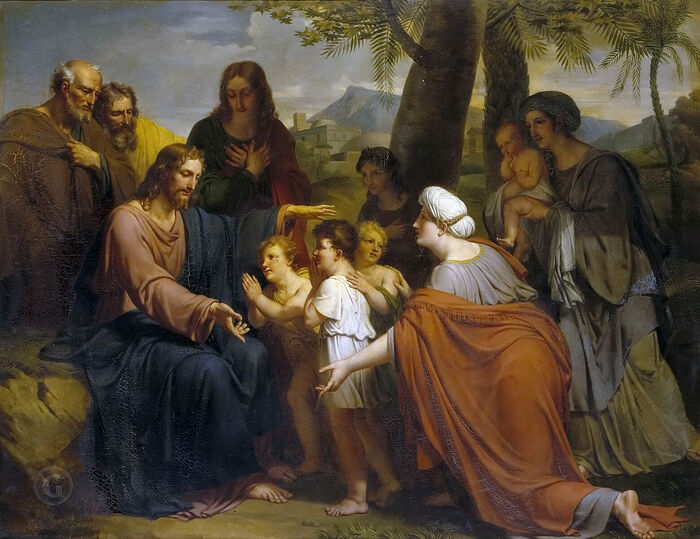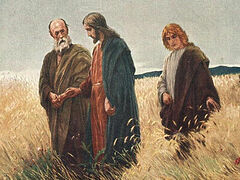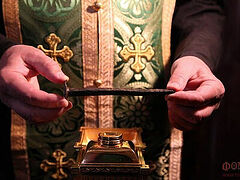 Antoine Ansiaux. Christ blessing the children. The Palace of Versailles. Photo: gallerix.ru
Antoine Ansiaux. Christ blessing the children. The Palace of Versailles. Photo: gallerix.ru
The Reading from the Epistle of St. Paul to the Galatians. (3:23-4:5) and The Reading from the Holy Gospel according to St. Luke. (13:10-17)
In today’s epistle St. Paul reminds the Christians in Galatia about the purpose of the Mosaic law. He tells them that the law was a custodian, a caretaker, a guardian for the people until the coming of the messiah, Jesus, the Christ. And then he tells them that now that faith in Christ has come, they and we, are all sons of God through faith. He tells us the former categories and identities we once had have all vanished away in light of our baptism into Christ. That is a radical change from the messages we receive today in our culture and society. You are encouraged to categorize yourself and others by your race and ethnicity, your political affiliation, your sexuality and your biological (or imagined biological) identities. We are encouraged to become tribal factions and to build up walls that divide us from one another.
St. Paul understood this. He lived it. He saw the world in that way as a faithful Jew. But his eyes were opened by his encounter with the resurrected Lord and this changed everything. Upon encountering and apprehending Christ, he saw the world differently. He says “For as many of you as were baptized into Christ have put on Christ. There is neither Jew nor Greek, there is neither slave nor free, there is neither male nor female; for you are all one in Christ Jesus.” Wow.
St. Paul had come to understand that there is only one criteria of importance for humanity. Either you belong to Christ or you don’t. He writes, “And if you are Christ’s, then you are Abraham’s offspring, heirs according to promise.”
But what does it mean to be Christ’s? What does it mean to belong to Christ? I think that in our modern era, this is an important question that needs answering. As we read the Church fathers, we get nearly unanimous voice about what it means to belong to Christ.
First it means that we are baptized into Christ.
Next it means that we obey the ten commandments and the teaching of Christ. Why is this so? Because the Lord Jesus Himself quoted from the ten commandments and turned to them as authoritative in the life of a believer. The ten commandments are the Law of God for mankind. Unless we know and obey these commandments we will be utterly incapable of knowing and comprehending Our Lord Jesus who perfectly fulfills the law of God in His person. You can’t belong to Christ and then have your own independent opinions on the teachings of Christ. We prove that we belong to Him through our obedience, which is a sign of our deep love and desire for Jesus.
St. Maximos the confessor writes, “Just as the result of disobedience is sin, so the result of obedience is virtue. And just as disobedience leads to breaking the commandments and to separation from Him who gave them, so obedience leads to keeping the commandments and to union with Him who gave them. Thus he who through obedience has kept the commandments has achieved righteousness and, moreover, he has not cut himself off from union in love with Him who gave them; and the opposite is equally true.” St. Maximus the Confessor, Philokalia, 2nd century on Theology
Belonging to Christ is even more than obedience to the commandments. It is a love, even an obsession with knowing, and loving Christ. Christ becomes the guiding force and motivation of our lives. In everything that we do or plan to do, we should step back and say “how does this action or choice reflect my love for Christ, who loved me and gave His life for me?” And it turns out that our beloved Orthodox Church instills this type of mindset in her children through all of the activities of her daily life. Everything that happens in the Church happens to help instill a deep love for Christ within us. We fast, we read, we pray, and we serve others, we give alms and we receive the sacraments in order to help us grow in Christ and truly put on Christ.
In today’s gospel reading we are also reminded that no matter who we are, we are sick. We each have various infirmities and illnesses, whether physical or spiritual. We each need healing, and sometimes we are sick for a very long time, sometimes months or years on end. This poor woman was sick for 18 years! Yet, we are also reminded that only One can provide such healing to us. Only one can free us and help us to live as sons and daughters of God.
In our Christian life it is important to recognize that we as Christians are always in the process of healing. We are never quite finished. My healing is not yet complete. Your healing is not yet complete. It is easy for us to get frustrated and to think that we will never be free of our various infirmities whether it is a physical sickness or an addiction or some other problem that we’ve face. But the Lord knows our situation and He loves mankind and helps us as we turn to Him and seek His healing.
What is important is that we continually run to Him, that we make Him ours so that He will make us His. As we run to Him especially through the life of the Church and all of her life-giving practices and medicines, we find that our life will become infused with Christ and with the Holy Spirit. We will indeed be healed and transformed through this relationship with Him. Be patient, have faith, do not lose hope. Only focus on the goal of knowing Christ and offering your life to Him and my dear brothers and sisters, He will surely offer His life to you. AMEN.



